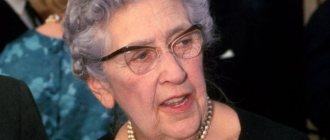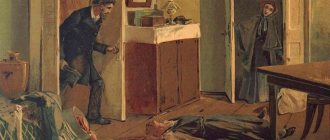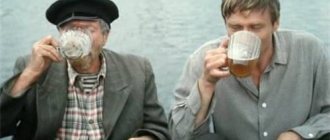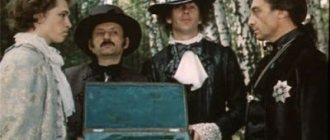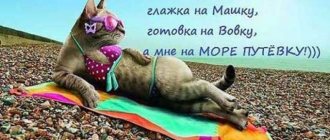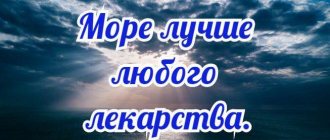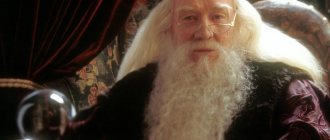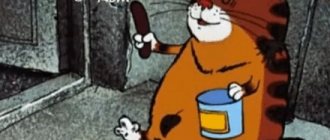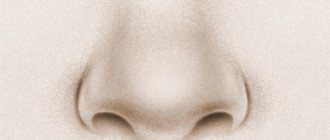One of the most popular Soviet films is “White Sun of the Desert.” The premiere took place in 1970. Catchphrases and quotes from the heroes have since been loved by everyone, although at that time the film was censored, which is hard to believe today. The director of the film was Vladimir Motyl, who at one time had to go through many difficulties: the organization of filming was carried out at a low level, and it took about two years to complete the film! At the end of production, the film was on the verge of being canceled due to cost overruns and poor footage.
The first person to see the footage of their film “White Sun of the Desert” was Leonid Brezhnev. Since he was a fan of westerns and action films, he really liked the movie and the film was allowed for public viewing.
This selection of quotes from the film “White Sun of the Desert” will remind you of the best moments of the Soviet film.
Abdullah
Go, go... A good wife, a good house - what else does a person need to meet old age?!
When I light the oil, you'll feel good. Very good!
I'm staying as a guest, but if I'm not there at noon, you'll come back to pay for my hospitality.
Why did you kill my people, Said?! I sent them to tell you not to look for Dzhavdet in Sukhoy Ruchey, he is not there.
The road is easier when you meet a good travel companion.
Before his death, my father said: “Abdullah, I lived my life as a poor man and I want God to send you an expensive robe and a beautiful harness for your horse.” I waited a long time, and then God said: “Get on your horse and take what you want, if you are brave and strong.”
...but who on this earth knows what good and evil are?
Maxmoud, rock it!
Aristarchus, negotiate with customs.
Well, one friend got in and won’t come out.
Do you want us to pay in gold?
Jamila, you were my beloved wife, why didn’t you die?
Quotes from the movie “White Sun of the Desert”
Who said that Soviet filmmakers didn’t shoot in the Eastern genre? Anyone who thinks so has apparently simply forgotten about “White Sun of the Desert,” a project by Vladimir Motyl. The creation of this genius is a favorite of millions to this day, but it was released on screens in 1970.
Do you want to enjoy this film, but don’t have any free time? While waiting for this, please yourself with selected quotes from the film “White Sun of the Desert”. It’s worth studying the aphorisms not only for fans of this movie, but also for those who are just about to watch it for the first time.
- How did you end up here? - They shot.
The master has appointed me as his beloved wife!
Vereshchagin, don’t start the longboat!...
- Gyulchatay, open your face, will you?
- East is a delicate matter.
- I do not drink. - Right. I’ll finish this now too... and quit. Drink!
Customs gives the go-ahead!
“You are our new husband, tell your man not to come.”
Down with prejudices! A woman is also a person!
The road is easier when you meet a good travel companion.
I had customs - there were smugglers. Now there are no customs - there are no smugglers.
Lately I have met people who are more and more sincere, one might say delicate.
Who on this earth knows what is good and evil?
Well, why should I wander around this desert all my life?!
- That's it, guys. I won't give you a machine gun.
– Stop the stupid song! And stand up when... the second lieutenant talks to you!
One wife loves, one sews clothes, one cooks food, one feeds the children, and all alone?... It’s hard!
Abdullah, are you still wearing a veil or are you dressed as a man?
Any questions? No questions!
I'm staying as a guest, but if I'm not there at noon, you'll come back to pay for my hospitality.
Should I kill you right away or do you want to suffer? “It’s better, of course, to suffer.”
Yes, his grenades are of the wrong system...
Go, go... A good wife, a good house - what else does a person need to meet old age?!
Your personality suits me - I like nimble people.
Goodbye, ladies! Sorry if that's not the case.
The sun here is so bright it’s so white in your eyes.
You know me, Abdullah, I don’t take bribes. I feel bad for the country.
Look, don't bury yourself anymore!
The dagger is good for those who have it, and bad for those who do not have it... at the right time.
- Leave at least the cartridge, Abdullah! There will be nothing to shoot yourself with.
Only my breath is constricted with joy, as if someone had hit me point-blank with a cannon.
Abdullah! You have affectionate wives! I feel good with them!
– Jamila, you were my beloved wife, why didn’t you die?
The dead, of course, are calmer, but it’s painfully boring.
And just call me Comrade Sukhov!
- You gave me this caviar again! I can’t eat it every damn day. At least I could get some bread.
– Javdet is a coward, Abdullah is a warrior. They don't like each other.
You will work freely, and each will have a separate spouse.
My soul yearns for you, beloved Katerina Matveevna, like a crane in the sky.
- Abdullah! Put your hands down...
Mahmoud, rock it!
Now I’ll open you, and be healthy!
Sukhov, help! ... After all, you alone are worth a whole platoon! Or even companies.
My Dzhavdet... If you meet him, don’t touch him...
He killed my father, buried me, took four sheep - we didn’t have any more.
If anything, I won't miss.
Listen, at least take the women.
Gyulchatay
The master has appointed me as his beloved wife!
One wife loves, one sews clothes, one cooks food, one feeds the children, and all alone?... It’s hard!
Can't you say that Gyulchatay is your beloved wife? Will she be offended?
You are our new husband, tell your man not to come.
Script and actors
Pavel Luspekayev starred in the film while seriously ill - due to his illness, he only had several toes amputated. I had to wear special orthopedic shoes and overcome the pain. Looking at how heroically the actor endures all the suffering, how selflessly he works, the director changed the design of the role. Customs officer Vereshchagin in the script was not such a large figure as in the film.
Pavel Luspekayev as Vereshchagin
Abdullah's wives are a different story. Don’t think that under every burqa there was a local village woman hiding, timid as a deer. Local village women categorically refused to film. In the frame, a basketball player, a hairdresser, a salesperson and a young scientist were running under a burqa. Well, soldiers - from time to time. Because both the seller and the scientist were not always able to take time off from work for filming.
The script did not contain a story about the wife of the Red Army soldier Sukhov - her
was invented by director Motyl, and the letters were written by Mark Zakharov.
The famous phrase of a second lieutenant thrown out of a window - “Yes
his grenade is of the wrong type”—also not in the script, it’s an improvisation.
Sukhov
I stayed here a little late!
East is a delicate matter.
Peacocks, you say... Heh!
If anything, I won't miss.
Hey master! Do you have a light?
Goodbye, ladies! Sorry if that's not the case.
Hello, fathers!
Here's a video on this topic:
Difficulties during filming
The film was slightly trimmed so as not to shock the viewer with too violent scenes. For example, they cut out the scene in which Vereshchagin's widow goes crazy.
The villainous Basmach Black Abdullah, or rather the actor who played his role, did not know how to ride a horse at all. He had to hold his horse by the bridle or ride his burly assistant on the shoulders.
Black Abdullah was played by Georgian actor Kakhi Kavsadze
But we might never see this movie - they were going to close it in the midst of the filming process. Motyl was accused of disbanding the group and, in general, being creatively unsuitable. The Ministry of Finance saved the day: it refused to write off the money spent on filming.
Plot[edit]
Demobilized Red Army soldier Fyodor Sukhov returns home through the Caspian desert. On the way, he finds Said, doomed to a painful death: he was buried up to his neck in hot sand by the people of the Basmach Dzhavdet. Sukhov saves Said, after which he continues on his way. But he manages to get away not far: a former colleague, comrade Rakhimov, dumps into his hands the harem of the former smuggler and current Basmach Black Abdullah, which he abandoned, intending to leave by sea to Iran.
Sukhov and the young Red Army soldier Petrukha, devoted to him, bring the women to a seaside town and place them in a museum so that they can wait for Rakhimov - but it becomes known that Abdullah is about to arrive in the town, who wants to use the longboat to cross to Iran. Having learned that his harem was in the hands of another man, Abdullah considers it a matter of honor to kill all the women. His gang numbers several dozen people - and Sukhov and Petrukha must resist them. Said leaves Sukhov, fearing that if he dies in battle with Abdullah, there will be no one to take revenge on Dzhavdet for his murdered father. Sukhov is trying to attract an ally - the former customs officer Vereshchagin, who is whileing out a war alien to him in a secluded house with peacocks...
In a nutshell
Comrade Sukhov completed his mission in the fraternal East, and now with a pure soul he returns home to Samara, to Katerina Matvevna and civilian life. But sometimes returning home can be difficult. Another unexpected matter arose.
Why you should re-read quotes from the film “White Sun of the Desert”
— Remember what happens when you encounter grenades of the wrong system. - And what to do when you can no longer eat this black caviar. — And where not to look for Dzhavdet.
Facts[edit]
- Valentin Yezhov, the author of the script, was exhausted trying to find an unusual story about the Civil War in Turkestan. What formed the basis of “White Sun” was found almost at the last moment, when Yezhov, already in complete despair, asked one of the former brigade commanders whether funny episodes had happened in this war. It was then that the brigade commander remembered the abandoned harems.
- Rustam Ibragimbekov had never been to the Caspian deserts before writing the script. But he lied to Yezhov about going far and wide across the desert to get on the film crew.
- Initially, the director was supposed to be A. Konchalovsky. He is also the “godfather” of Fyodor Sukhov. The second candidate for director was Vytautas Žalakyavičius, who directed “Nobody Wanted to Die” (I wonder how it would have worked out for him). The third is Andrei Tarkovsky (how good it is that he did not have the time or desire). And only the fourth person to be offered was Vladimir Motyl. Moreover, Motyl completely did not want to do this and agreed only for the sake of money - he and his elderly mother had nowhere to live. Truly, the best Western of the USSR should have been called “For a Fistful of Rubles.”
- The first version of the title was “Save the Harem,” but officials scolded it: what does “save” mean, “return to the owner,” or what?
- In the original version of the script (it was called “Desert”), instead of a longboat there was a steam locomotive, which Abdullah’s wives helped to repair. Vereshchagin was a telegraph operator, and his wife Irina fell in love with Said. Said was supposed to die along with Vereshchagin.
- Luspekayev suffered severe frostbite on his feet during the war, after which he walked on crutches. In addition, he had suffered from diabetes for a long time, and a diabetic foot did not make walking any easier. But he basically acted in the film without crutches, although on the way from the hotel to the set along the sand every 20 meters he was forced to rest on a chair that his wife carried behind him.
- In business correspondence between the Experimental Creative Film Studio and Goskino, “Pustynya” was repeatedly and openly called a Western.
- Ekaterina Matveevna is an image invented by Motyl. It was Sukhov’s desire to get home to the woman he loved that became the core that gives his image integrity and depth.
- Galina Luchai is not an actress, but a journalist. But she played Katerina Matveevna. In the scene where Katerina lifts her hem high to cross the stream, Galina categorically refused to “be naked” in front of the camera, and “Katerina Matveevna’s bare legs” were played by an understudy.
- For irrational censorship reasons, several expressive moments were cut out of the picture: the harem mourns Abdullah, Vereshchagin’s wife goes crazy, Abdullah and Sukhov fight hand-to-hand in the sea.
- One of Abdullah's wives was played by a currency prostitute - Motyl wanted to film a completely innocent sex scene (the naked wife feeds the naked Abdullah grapes). The scene was filmed, but it also had to be thrown out of the film at the request of the censors.
- Kakhi Kavsadze has never watched a film in its entirety in 50 years - he doesn’t like to see himself on screen.
Anything else? Yes, I have them.
An ordinary miracle (Today I will party. Fun, good-naturedly, with everyone.)
Ivan Vasilyevich changes profession (Man! Man! Waiter! Kidneys once for the queen.)
Pokrovsky Gate (I don’t know, I’m all so sudden, so contradictory.)
Hello I'm your aunt! (I'll kiss you. Later. If you want.)
Diamond hand (Well, we’ll take measures. What to do? Fight drunkenness!)
Rango (There is a drought in our city, and yet someone is draining water into the desert)
Derivative creativity[edit]
- Video game from 1C “White Sun of the Desert” (2004) Adventure genre. Based on the movie. What the hell is this, author? — was there really a need for a scene where a peacock chokes to death on a bone?
- Hellish training - Abdullah went through it. Moreover, this is highlighted in the description of the final exam in the desert.
- Shaitan - Sukhov was nicknamed “Shaitan” by local Red Army soldiers for his daring dam bombing and was greatly respected.
Parodies[edit]
- NTV program “Dolls”: “The East is a delicate matter” (broadcast 05/13/1995)
- “Green Sun of the Desert” (broadcast 10/14/2001)

